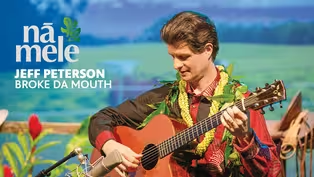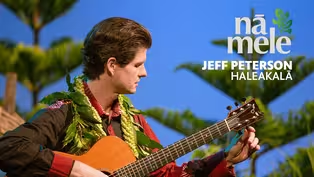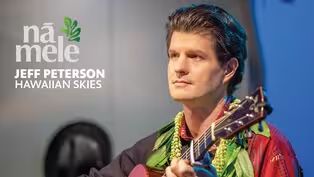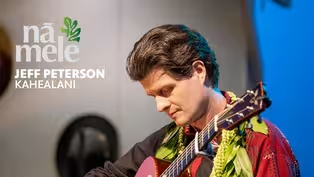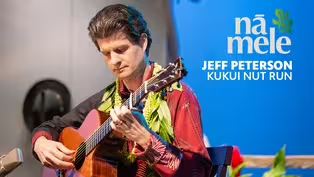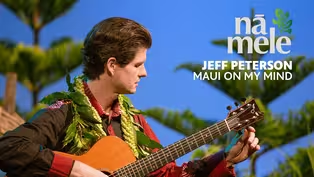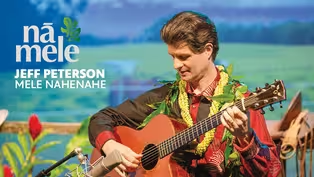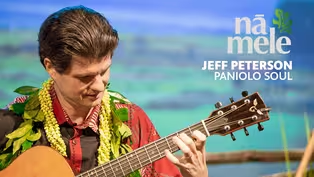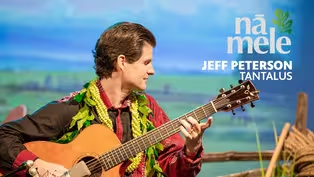
Jeff Peterson
Special | 31m 47sVideo has Closed Captions
Slack key master Jeff Peterson.
Slack key master Jeff Peterson has strummed his way to a remarkable career contributing to two Grammy Award-winning records, eleven Nā Hōkū Hanohano awards, composing and performing the first ever Concerto for Slack Key Guitar and Orchestra and traveling the world sharing his music.
Problems playing video? | Closed Captioning Feedback
Problems playing video? | Closed Captioning Feedback
Nā Mele is a local public television program presented by PBS Hawai'i

Jeff Peterson
Special | 31m 47sVideo has Closed Captions
Slack key master Jeff Peterson has strummed his way to a remarkable career contributing to two Grammy Award-winning records, eleven Nā Hōkū Hanohano awards, composing and performing the first ever Concerto for Slack Key Guitar and Orchestra and traveling the world sharing his music.
Problems playing video? | Closed Captioning Feedback
How to Watch Nā Mele
Nā Mele is available to stream on pbs.org and the free PBS App, available on iPhone, Apple TV, Android TV, Android smartphones, Amazon Fire TV, Amazon Fire Tablet, Roku, Samsung Smart TV, and Vizio.
Jeff Peterson I grew up in the island of Maui.
Really beautiful part of Maui, the area called Makawao.
And that's up on Haleakalā mountain.
It's about 2,000 foot elevation up there and there's a road that goes up above Makawao called Olinda Road, and my ʻohana is right up in the pasture lands next to Haleakala Ranch in that area there.
(instrumental guitar playing Haleakalā song) Jeff Peterson So, my father was a cowboy paniolo at Haleakala Ranch.
And his way of unwinding often would be to just grab his guitar and play a little bit.
So, before I even have memories of hearing recorded music, I got to hear live music and his friends would come over and play.
We'd go camping all over Maui, he loved fishing.
And also there's a cabin called the Peanut House way up on the mountain.
And so, usually as soon as we get to the fishing spot or up to the cabin, everyone would bring out instruments and start playing.
So, I was really lucky before I could even get my arms around a guitar, or even a ʻukulele, I was hearing live music.
(instrumental guitar playing Mele Nahenahe song) Jeff Peterson I was inspired to learn guitar by hearing the paniolos play.
I probably tried to start playing, I was probably around seven or eight.
I really wanted to have a great teacher and have some of the the paniolo teach me but they just love getting together and sharing music and not too much about you know, teaching at all.
So, I just had to watch and listen and learn.
My dad showed me a few chords and from there I just developed my ear.
So, I was entirely self taught growing up and what I learned is I could play recordings and just try to match the sound of the recording.
My dad would always leave a guitar laying around, he had this old acoustic guitar and he used the suji the fishing line to change strings every now and then.
It didn't sound that great, but it, it was, you know, a great guitar for taking out in the pastures and you know, you could just pack it in the back of your horse.
(instrumental guitar playing Paniolo Soul song) Jeff Peterson I wrote the song The Kukui Nut Run based on a story my dad told me about the old timers on Haleakala Ranch, they were real kolohe, rascals.
And so one thing that some of them had done in the past they take a new person who's hired out into the ranches, a lot to learn that whole mountainside, you have to learn about all the pastures how they move the cattle, where the rain falls, and all the different things that are part of the paniolo lifestyle.
And you're out there in the pasture, you get really hungry.
So the old timers, "Oh, we got you covered, we bring bring lunch."
But they'd mix in some ʻinamona, and then put plenty ʻinamona so that, ʻinamona is a kukui nut relish and it's delicious.
I love having some on with poke and you know, but if you if you have too much it can upset your stomach.
(instrumental guitar playing The Kukui Nut Run song) Jeff Peterson As I started getting deeper into playing music on my own and listening, I started getting interested in you know, first hearing Hawaiian music and then you know the folk music that my dad had these vinyl albums of my mom and dad listened to the great collection of music.
I started to hear other types of music like, you know, like most kids, I heard rock bands and everything from Eddie Van Halen, to Stevie Ray Vaughan, great guitar players.
But then I got interested in classical music and jazz and really realized that the guitar has such an amazing history and is such an important part of so many cultures, not just here in Hawaiʻi with kī hōʻalu, but around the world from the roots of flamenco and classical music, and then how guitar is such an important part of you know, pop music and blues and rock and roll and jazz.
So, it made it really exciting just to dive deep into studying all that I could find out about the instrument.
(instrumental guitar playing Tantalus song) Jeff Peterson I find that whenever I tour playing Hawaiian music, there's something about kī hōʻalu that is it's universal.
It's emotional, it's soulful.
And so, I've been able to connect with audiences that don't speak, we don't speak the same language, but they can connect through the sound of the music.
And so, I think music is a very powerful, universal language in that way.
But I also have found that one thing that I try to do is I try to learn from the cultures that I'm visiting.
So, in all the tours that I did with Keola Beamer, for example, I learned music from Venezuela.
I learned their paniolo music.
There's a type of music called joropo.
I learned different regional music as we toured around Brazil.
I learned some of the music from Mali, and Zimbabwe area in Africa.
I love to be a student, I think I'm just constantly trying to learn and absorb new ideas.
And so, a big way I found it to connect with people from around the world is to play, to share my culture, but also to show appreciation and interest in their culture.
(instrumental guitar playing Maui on My Mind song) Jeff Peterson One of my main goals now after having a lot of experience performing music is perpetuating kī hōʻalu and I feel that I'd love to see more of the younger generation playing.
And I feel the the art form was almost lost in the past because it was just not really out in the public.
It was in the backyards and not really recorded much.
It wasn't until the late 40s that Gabby Pahinui recorded Hiʻilawe and then that led to many more recordings.
Then it was finally in the 60s that solo albums of slack key started coming out.
And so one of my main goals now is trying to educate.
So, I've written a book on slack key.
And I've been trying to notate taking my background of what I've learned in school, I've been writing down the tradition so that it's documented.
So, it's mainly learned by listening, it's a oral tradition.
But I think it's important to have it written down as well.
(instrumental guitar playing Hawaiian Skies song) Jeff Peterson One thing that I love about Hawaiian music is there's such an incredible history of the music and music that goes all the way back to the mid 1800s is still a very important part of the music now.
And if you think of the songwriters being part of the royal family, Nā Lani ʻEha, Liliʻuokalani, Kalākaua, Leleihoku, Princess Likelike, their music is still really important today.
And I found within this music, every generation, there is a more of a story to tell.
And so much of the mixture of cultural influence that we have here in Hawaiʻi coming from the the Portuguese bringing the braguinha, that became the ʻukulele, they brought steel strings that we use to get that traditional slack key sound.
That influence is a really big part of the music and their influences, of course, coming from church music, and the choral music, Henry Berger, the director of the Royal Hawaiian Band, and his he was a protege of Strauss, so he had all this amazing classical background.
He mentored the royal family.
Then moving forward through the jazz era, the swing era, thinking of Hawaiʻi Calls all the great music that came out of that era, the Hawaiian music, Renaissance and cultural renaissance of the 1970s.
And now there's a whole wave from that time of, of young artists who are, their fluent in Hawaiian ʻolelo, and the writing music original, beautiful new music continuing to tell stories about what we love about the people in the places here in Hawaiʻi.
So this music is has such a deep history, and it's still evolving.
(instrumental guitar playing Kahealani song)
Video has Closed Captions
Clip: Special | 3m 12s | Slack key master Jeff Peterson performs his song "Broke Da Mouth." (3m 12s)
Video has Closed Captions
Clip: Special | 4m 37s | Slack key master Jeff Peterson performs his song "Haleakalā." (4m 37s)
Video has Closed Captions
Clip: Special | 3m 37s | Slack key master Jeff Peterson performs the song "Hawaiian Skies." (3m 37s)
Video has Closed Captions
Clip: Special | 4m 54s | Slack key master Jeff Peterson performs his song "Kahealani." (4m 54s)
Video has Closed Captions
Clip: Special | 3m 33s | Jeff Peterson performs his song "Kukui Nut Run." (3m 33s)
Video has Closed Captions
Clip: Special | 5m 12s | Slack key master Jeff Peterson performs "Maui on My Mind." (5m 12s)
Video has Closed Captions
Clip: Special | 3m 22s | Slack key master Jeff Peterson performs "Mele Nahenahe." (3m 22s)
Video has Closed Captions
Clip: Special | 5m 4s | Slack key master Jeff Peterson performs his song "Paniolo Soul." (5m 4s)
Video has Closed Captions
Clip: Special | 4m 11s | Slack key master Jeff Peterson performs his song "Tantalus." (4m 11s)
Providing Support for PBS.org
Learn Moreabout PBS online sponsorshipSupport for PBS provided by:
Nā Mele is a local public television program presented by PBS Hawai'i
